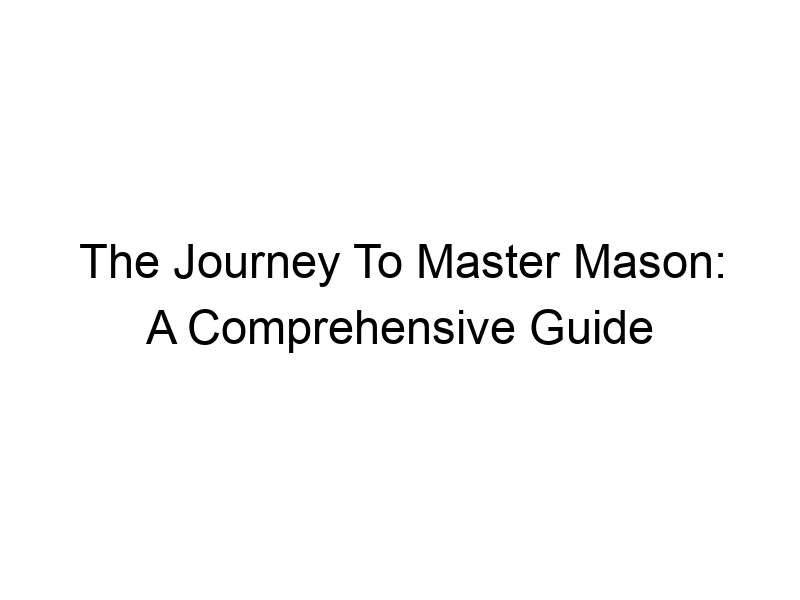Many aspiring craftspeople wonder, how long does it take to become a master mason? This in-depth guide will explore this question, unraveling the intricacies of the path to becoming a master mason. We’ll examine the time commitment, the skills required, the different stages of apprenticeship, and the factors influencing the overall duration. You’ll learn about the dedication, patience, and expertise needed to achieve this prestigious title.
Masonry, the art and skill of building with stone, brick, concrete blocks, and other similar materials, is a time-honored profession. Master masons are the pinnacle of this trade, possessing unparalleled skill and experience. Their work is characterized by precision, artistry, and structural integrity.
The journey begins with an apprenticeship, a structured period of learning under the guidance of experienced masons. Apprentices gain hands-on experience, learning the fundamental techniques of
bricklaying, stone cutting, mortar mixing, and blueprint reading. The duration of this phase typically ranges from three to five years.
The Rigors of Apprenticeship: A Deep Dive
Apprenticeship is not simply about learning basic techniques. It involves rigorous training covering theoretical and practical aspects.
Hands-On Training and Practical Application
Apprentices spend significant time on construction sites, working alongside journeymen masons. They progressively take on more responsibility, moving from simple tasks to complex projects.
The Journeyman Phase: Refining Skills
Once an apprentice completes their training, they become a journeyman mason. This is a significant milestone indicating a high level of competence.
Building Expertise and Specialization
Journeymen continue to refine their skills, often specializing in particular aspects of masonry such as stone carving, bricklaying, or restoration work. They become proficient in different materials and techniques. This phase can last for several years, depending on the individual’s ambition and the complexity of projects undertaken.
The Master Mason: A Pinnacle of Achievement
The final stage involves becoming a Master Mason. This title is not automatically granted after a certain number of years; it necessitates demonstrating a high level of mastery in several crucial areas.
Mastering Skills and Demonstrating Proficiency
To become a Master Mason, individuals need to present a comprehensive portfolio showcasing their ability to complete a vast array of projects with the highest standards of quality and precision. This typically involves constructing complex structures, demonstrating advanced techniques, and demonstrating a thorough understanding of building codes and safety regulations.
Professional Examinations and Certifications
Often, there are formal examinations or certifications that must be passed to achieve Master Mason status. These assessments test not just practical skills but also theoretical knowledge and an understanding of architectural design and construction principles.
Factors Influencing the Time Taken
The time it takes to reach master mason status is not fixed. Several factors influence this timeframe.
Individual Aptitude and Learning Curve
Some individuals grasp skills more rapidly than others. Those with a natural aptitude for masonry and a strong work ethic may progress quicker.
Opportunity and Experience
Access to a wide variety of projects and a supportive work environment significantly impacts the rate of learning. Exposure to diverse challenges is crucial to becoming a master.
Benefits of Becoming a Master Mason
The rewards of achieving Master Mason status are significant.
Higher Earning Potential and Career Advancement
Master masons command higher wages and enjoy increased career opportunities. They often lead teams, manage projects, and have greater autonomy in their work.
Prestige and Recognition
Master masons are highly respected within the construction industry and broader community. They have established a reputation for excellence and expertise.
Challenges and Limitations
The path to becoming a master mason is not without its challenges.
Physical Demands and Potential Risks
Masonry involves physically demanding work with potential risks of injury. Maintaining physical fitness and adhering to safety regulations are essential.
Competition and Market Fluctuations
The construction industry experiences fluctuations. Competition for jobs and projects can be intense.
Comparing Different Masonry Paths
There are different paths to becoming a master mason, such as formal apprenticeships, vocational schools, and on-the-job training.
Formal Apprenticeships vs. Self-Taught
Formal apprenticeships offer structured training, while self-taught paths require exceptional dedication and self-discipline. Both have their own pros and cons.
Setting Up for Success in Masonry
Aspiring master masons need to make strategic choices to maximize their chances of success.
Choosing the Right Apprenticeship or Training Program
Thorough research into the available training programs is essential to finding a reputable and suitable option. The quality of instruction and mentorship significantly impact the learning experience.
Advanced Masonry Techniques: Specialization
Master masons often specialize in particular techniques or types of masonry.
Restoration and Historical Masonry
Restoring historical structures requires specialized skills and knowledge, often involving intricate techniques and careful preservation methods.
Tools and Equipment in Master Masonry
Master masons require specialized tools and equipment.
Specialized Cutting Tools and Precision Instruments
Precision cutting tools and specialized instruments are vital for creating accurate and high-quality masonry work.
Safety Regulations and Best Practices
Safety is paramount in masonry.
Understanding OSHA Regulations and Safety Protocols
Understanding and strictly adhering to safety regulations are crucial for preventing accidents and injuries.
The Role of Technology in Modern Masonry
Technology plays an increasing role in modern masonry.
CAD Software and Digital Modeling
CAD software and digital modeling are used for design and planning, improving efficiency and precision.
Networking and Mentorship in Masonry
Networking and mentorship are crucial for career advancement in masonry.
Building Relationships with Experienced Professionals
Building strong relationships with experienced masons provides invaluable support and guidance.
Master Mason Salary and Career Outlook
The salary and career outlook for master masons are generally favorable.
Average Earnings and Geographic Variations
The average earnings for a master mason vary depending on location, experience, and specialization.
Frequently Asked Questions
What are the educational requirements to become a master mason?
While a formal degree isn’t always mandatory, many apprenticeships prefer applicants with high school diplomas or GEDs. Some specialized areas may require additional certifications or vocational training.
How much does a master mason earn?
Salaries for master masons vary widely depending on location, experience, and specialization. However, generally, they earn significantly more than journeymen masons, often exceeding $70,000 annually in many regions.
What are the potential career paths for a master mason?
Master masons can pursue various career paths, including project management, supervisory roles, self-employment, or specialized work in areas like historical restoration or high-rise construction.
Is there a specific age requirement to become a master mason?
There is no age requirement to become a master mason, but the profession requires physical stamina and dexterity, which can become more challenging with age.
Final Thoughts
Becoming a master mason is a journey that requires dedication, patience, and a relentless pursuit of excellence. While the exact timeframe varies, it generally involves years of intensive training, practical experience, and continuous learning. The rewards, however, are substantial, including a highly respected profession, excellent earning potential, and the satisfaction of creating lasting structures. The path may be challenging, but the outcome – becoming a skilled and respected master mason – is truly rewarding. If you’re passionate about construction, detail-oriented work, and a challenging career, consider the path to becoming a master mason – it might just be the perfect fit.

